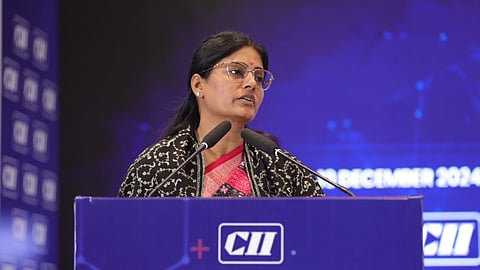'India fourth largest medical devices market after Japan, China and South Korea': Union Minister Anupriya Patel
NEW DELHI: India is the fourth largest medical devices market in Asia after Japan, China, and South Korea and among the top 20 global medical devices markets in the world, said Union Minister of State of Health and Family Welfare Anupriya Patel on Thursday.
Speaking at the 21st Health Summit of the Confederation of Indian Industry (CII), she said the medical device sector in India is recognised as a sunrise sector because of its immense growth potential driven by the country's increasing healthcare needs, technological innovations, government support, and emerging market opportunities.
“AI innovation is crucial within healthcare to create new methods for facilitating and tackling healthcare challenges and discovering new opportunities,” she said.
Addressing the plenary session on Charting India’s MedTech Revolution: MedTech Expansion roadmap to 2047, Patel said that the size of the Indian medical devices sector is estimated to be around USD 14 billion and it is expected to grow to USD 30 Billion by 2030.
She stressed that the MedTech industry is not just a component of healthcare but is the catalyst that links patients, payors, providers, and regulators to create a stronger and more equitable healthcare system.
“It is this unique positioning of MedTech that holds the promise of revolutionizing healthcare delivery and outcomes, both in India and globally,” she said.
She highlighted that the government is trying to strengthen the medical device ecosystem by focusing on boosting domestic manufacturing, promoting research, enhancing skill development, and increasing India's share in the global market.
“Key policy decisions include allowing 100 per cent FDI under the automatic route and the approval of the National Medical Device Policy, 2023, which addresses regulatory streamlining, infrastructure development, R&D, investment attraction, and human resource development. This includes the establishment of Centres of Excellence, courses at NIPERs, and initiatives to strengthen MedTech education,” she said.
The minister also noted that the government has taken steps to boost exports and industry collaboration, with the creation of the Export Promotion Council for Medical Devices (EPCMD) and the reconstitution of the National Medical Devices Promotion Council (NMDPC).
“These bodies aim to facilitate medical device exports, resolve regulatory challenges, and enhance the Ease of Doing Business, further promoting India's position in the global medical device market,” she said.
She also informed about the launch of the Scheme for Promotion of Medical Devices Parks with a Rs 400 crore outlay, providing Rs 100 crore each to Uttar Pradesh, Tamil Nadu, Madhya Pradesh, and Himachal Pradesh for infrastructure development.
Additionally, the Promotion of Research in Pharma-Medtech Sector (PRIP) and the Scheme for Strengthening the Medical Device Industry with Rs 500 crore funding aim to foster innovation, enhance manufacturing capabilities, support skill development, and promote industry growth.
These efforts align with the vision of Atmanirbhar Bharat, focusing on self-reliance, innovation, and global competitiveness in the MedTech industry, she said.
Underlining that a healthy population fuels productivity, drives economic growth, and ensures social justice, Union Health Secretary, Punya Salila Srivastava said that “healthcare is not just a social imperative but an economic necessity.”
She noted that India’s healthcare agenda focuses on making healthcare affordable, accessible, and inclusive for every citizen and stressed that the healthcare sector is a critical component of India’s vision to become a developed country by 2047.
“The private sector plays a key role in transforming healthcare, particularly in Tier-2 and Tier-3 cities, through value-based care models and technological innovations. Public-private partnerships, preventive healthcare, and a focus on expanding the healthcare workforce will be critical in achieving Universal Health Coverage and positioning India as a global leader,” she said.
“The goal is to transform India into a global leader in healthcare delivery by 2047, aiming for a healthier, stronger, and prosperous India. The private sector's role in shaping India's healthcare future is both a responsibility and an opportunity. By embracing this vision, quality healthcare will be provided to every Indian, driving economic growth and job creation,” the health secretary said.

